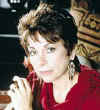| the-south-asian.com AUGUST 2001 | ||
| about us contact us data bank past issues the craft shop the print gallery | ||
|
SOCIETY & CULTURE Traditional
societies - Wisdom and Challenges SOUTH ASIAN FEATURE Hands
Across Borders INTERVIEW
Shantiniketan
and origin of Modern Art
Reinventing
India
Royal
Bengal's last roar?
|
Page 1 of 5
Reflections on Traditional Cultures - their wisdom and challenges by ISABEL ALLENDE
"ět is our ethnic and cultural diversity-our differences in language, customs and beliefs-that provide the strength, resiliency and creativity of our species."
I WAS BORN over a half-century ago in the Southern Hemisphere, before television made its appearance. It was a quiet life in a provincial atmosphere, bounded by the streets of our neighborhood. I thought that everyone was like us, except for the poor people I saw from time to time when we drove out into the country, and who filled me with a mixture of pity and fear. They seemed different, as if they lived in another dimension. THE FIRST TIME I had any hint of the size and complexity of the world was when one of my uncles returned from India. He was the only person in the family, probably in the whole city, who had traveled so far from home. He had set out in search of the 999 names of God and returned a skeleton with eyes of an illuminati, with no luggage but a few yellowing notebooks in which he had recorded his impressions. We children would sit at his feet and listen to his stories of faraway peoples, amazing customs, landscapes of stunning beauty, and temples of multiple gods. This prodigious uncle was the professor of a crystal ball. It was, I suppose, only a simple glass sphere, one of those things fishing boats use as floats for their nets, but he convinced us that in it we could see any point on earth. His words were so eloquent and we children were so hypnotized that in fact we did believe we saw reflected in that magical ball all the visions summoned by our uncle. Thanks to him, I developed an uncontainable curiosity about other cultures that has taken me many places around the globe, and today I can say, like the great Mexican writer Octavio Paz, that ět is our ethnic and cultural diversity-our differences in language, customs and beliefs-that provide the strength, resiliency and creativity of our species.
Copyright © 2000 - 2001 [the-south-asian.com]. Intellectual Property. All rights reserved. |
|
